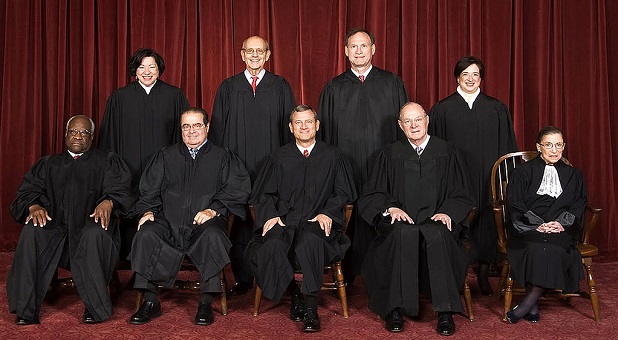5 Key Points from the Supreme Court Dissents on Gay ‘Marriage’
This morning, the Supreme Court ruled 5-4 that the U.S. Constitution contains an inalienable “right” to gay “marriage,” which must be recognized nationwide. The decision in Obergefell v. Hodges, written by Justice Anthony Kennedy, was so controversial that each of the four conservative justices wrote their own dissent. Here are the key points those justices made: 1. The gay “marriage” decision silences the American people and violates democracy. Chief Justice John Roberts wrote that the decision to invent a new constitutional right to gay “marriage” is wrong, because “this Court is not a legislature. Whether same-sex marriage is a good idea should be of no concern to us.” “Under the Constitution, judges have power to say what the law is, not what it should be,” he wrote. Instead, today’s ruling displays the liberal justices’ “extravagant conception of judicial supremacy,” taken “at the expense of the people.” Justices Antonin Scalia and Clarence Thomas agreed with Roberts but wrote a separate dissent specifically “to call attention to this Court’s threat to American democracy.” 2. It threatens religious liberty. Justice Clarence Thomas wrote that the decision will have “potentially ruinous consequences for religious liberty.” The Obama administration admitted that the tax-exempt status of religious organizations that oppose homosexuality will “be an issue” in the years to come if the Supreme Court ruled as it did today. “In our society, marriage is not simply a governmental institution; it is a religious institution as well. Today’s decision might change the former, but it cannot change the latter. It appears all but inevitable that the two will come into conflict,” Justice Thomas wrote. The court’s liberal bloc, he observed, “appears unmoved by that inevitability. It makes only a weak gesture toward religious liberty in a single paragraph. And even that gesture indicates a misunderstanding of religious liberty in our nation’s tradition.” The majority opinion said that redefining marriage would not trample Christian’s rights, because religious organizations and faithful people still have the right to “teach the principles that are so fulfilling and so central to their lives and faiths.” But that is a massive truncation of the Constitutional guarantee of the free exercise of religion. “Religious liberty is about freedom of action in matters of religion generally, and the scope of that liberty is directly correlated to the civil restraints placed upon religious property,” he wrote. 3. It opens the door to polygamy or other assaults against marriage. Chief Justice Roberts wrote, “It is striking how much of the majority’s reasoning would apply with equal force to the claim of a fundamental right to plural marriage,” or polygamy – such as that practiced by Muslims or fringe sects of the Mormon faith. “Why would there be any less dignity in the bond between three people who, in exercising their autonomy, seek to make the profound choice to marry?” he asked. “If a same-sex couple has the constitutional right to marry because their children would otherwise ‘suffer the stigma of knowing their families are somehow lesser,’ why wouldn’t the same reasoning apply to a family of three or more persons raising children? If not having the opportunity to marry ‘serves to disrespect and subordinate’ gay and lesbian couples, why wouldn’t the same [ban] serve to disrespect and subordinate people who find fulfillment in polyamorous relationships?” “I do not mean to equate marriage between same-sex couples with plural marriages in all respects. There may well be relevant differences that compel different legal analysis,” he wrote. “But if there are, petitioners have not pointed to any.” When asked about a polygamy during oral arguments in April, the supporters of gay “marriage” responded that at present the state “doesn’t have such an institution.” “But that is exactly the point,” Roberts wrote. “The States at issue here do not have an institution of same-sex marriage, either.” 4. It violates the American definition of liberty. Clarence Thomas said the majority decision changed, not just the definition of marriage, but overturns constitutional order. The majority opinion changes America from a limited government that exists as a constitutional republic to a big and expanding welfare state. “In the American legal tradition, liberty has long been understood as individual freedom from governmental action, not as a right to a particular governmental entitlement,” Justice Thomas wrote. “Our Constitution — like the Declaration of Independence before it — was predicated on a simple truth: One’s liberty, not to mention one’s dignity, was something to be shielded from — not provided by — the State.” “The majority’s inversion of the original meaning of liberty will likely cause collateral damage to other aspects of our constitutional order that protect liberty,” he warned. 5. Not one evangelical could participate in the decision. Justice Antonin Scalia noted that the Supreme Court does not include one evangelical, or a Protestant of any background. You can read more here.
















































